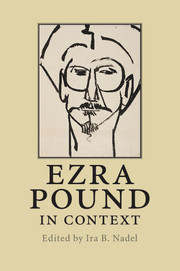Book contents
- Frontmatter
- Contents
- Notes on contributors
- Acknowledgements
- Chronology
- List of abbreviations and note on references to The Cantos
- Introduction
- Part I Biography and works
- 1 Prose criticism
- 2 Poetics
- 3 Translation
- 4 Romance languages
- 5 Letters
- 6 Editor, anthologist
- 7 Education
- 8 Journalism
- 9 Politics
- 10 Economics
- 11 Radio broadcasts
- 12 Law
- 13 Textual criticism
- 14 Archives
- 15 The Lives of Pound
- Part II Historical and cultural context
- Part III Critical reception
- Further reading
- Index
- References
8 - Journalism
Published online by Cambridge University Press: 05 July 2014
- Frontmatter
- Contents
- Notes on contributors
- Acknowledgements
- Chronology
- List of abbreviations and note on references to The Cantos
- Introduction
- Part I Biography and works
- 1 Prose criticism
- 2 Poetics
- 3 Translation
- 4 Romance languages
- 5 Letters
- 6 Editor, anthologist
- 7 Education
- 8 Journalism
- 9 Politics
- 10 Economics
- 11 Radio broadcasts
- 12 Law
- 13 Textual criticism
- 14 Archives
- 15 The Lives of Pound
- Part II Historical and cultural context
- Part III Critical reception
- Further reading
- Index
- References
Summary
Men of the future will not give a fahrt for the so-called poets unless they (the poets) combat the blackout of significant historical facts and the falsification of current news.
Ezra PoundEzra Pound was a poet first, a journalist second. Throughout his long life, he wrote thousands of literary essays, letters, editorials, and manifestoes for British, Japanese, American, French, and Italian newspapers so that his ideas could be transmitted in a timely fashion. To this day, however, Pound is not really remembered for his journalism, in part, because there is no comprehensive, annotated edition of his articles complete with translations. Anyone trying to read through Pound's journalism is forced to track down a copy of the oversized, twelve-volume collection Ezra Pound's Poetry and Prose Contributions to Periodicals (without notes or context), which is hard to come by, or turn to the Literary Essays and the Selected Prose, 1909–65, both of them organized as a “greatest hits” series that emphasizes Pound's more “literary” side.
Pound's journalism, though occasional, is absolutely critical for anyone with an interest in his life and work. In fact, it was in the columns of the newspapers that he engaged most directly with the public, doing everything he could to get his ideas in circulation. He published “How to Read,” for instance, in the book section of the New York Herald (1929) and had it reprinted in a Genovese newspaper, L’Indice (March 20, 1930) and the Tokyo-based Japan Times Weekly (February 20, and March 20, 1930). This mode of communicating with an international public through newspapers was Pound's way of keeping in touch with the world. In the 1910s and 1920s, he was mostly concerned with literary matters, and by the 1930s and 1940s, he shifted his attention to politics, economics, and history. And even if his subjects changed over the decades, his determination to educate the masses remained fixed.
- Type
- Chapter
- Information
- Ezra Pound in Context , pp. 85 - 95Publisher: Cambridge University PressPrint publication year: 2010
References
- 1
- Cited by

